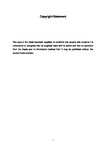Motivation to Conduct Research in a Rapidly Evolving Academic Environment: A Study of Coimbatore’s Engineering Institutions
| dc.contributor.supervisor | Miles, Mike | |
| dc.contributor.author | Bakthavatchaalam, Venkat Prakash | |
| dc.contributor.other | School of Engineering, Computing and Mathematics | en_US |
| dc.date.accessioned | 2019-09-02T14:21:17Z | |
| dc.date.available | 2019-09-02T14:21:17Z | |
| dc.date.issued | 2019 | |
| dc.date.issued | 2019 | |
| dc.identifier | 10131370 | en_US |
| dc.identifier.uri | http://hdl.handle.net/10026.1/14860 | |
| dc.description | 1. BAKTHAVATCHAALAM, V., MILES, M., MACHADO-TAYLOR, M. D. L. & GINGELE, J. 2018. Evolution of Coimbatore’s Engineering Institutions: Current challenges and future directions. Higher Education in Central and Eastern Europe: National, Regional and European Trajectories. Budapest, Hungary: CEU. 2. BAKTHAVATCHAALAM, V. P., MILES, M., HORODNIC, I. A. & MACHADO-TAYLOR, M. L., 2017, Research Productivity of Higher Educational Systems in Transition: A Study of Engineering Institutions in Coimbatore, India. MISSION RESPONSIBLE: Future of Education and Youth Work, 30/11/2017 - 02/12/2017 2017b Athens, Greece. 3. BAKTHAVATCHAALAM, V. P., MILES, M., HORODNIC, I. A. & GINGELE, J. 2017. Influences of Cultural Identities on the Research Productivity of Academics: A Study of Engineering Institutions in South India. UNESCO’s World Humanities Conference, 06-12/08/2017 2017a Liege, Belgium. Liege: UNESCO. 4. BAKTHAVATCHAALAM, V. P., MILES, M., FOX, A. & GINGELE, J. 2015. Shifting the threshold of motivation theory to overcome local disquietudes in Coimbatore, India. V.C.’s conference. Plymouth, UK. 5. BAKTHAVATCHAALAM, V. P., MILES, M. & GINGELE, J. 2013. A Review of the Studies on Motivational Practices in Higher Educational Institutions in Developing Countries. International Conference on Academic Disciplines. Rome, Italy. 6. BAKTHAVATCHAALAM, V. P., FOX, A. & SHERIF, K., 2011, Overcoming failures in placements of people from parent companies to a foreign subsidiary organisation. Change Management in a Dynamic Environment, 2011 Politehnica University of Bucharest, Bucharest, Romania. 338-345. 7. BAKTHAVATCHAALAM, V. P. & FOX, A. 2010. Human Resource Management in Indian Industries: Motivating Businesses to Sustain Economic Development into the Future. Rai Management Journal, | en_US |
| dc.description.abstract |
The Indian academic system is in a period of rapid transition evidenced by the increasing number of Higher Education Institutions (HEIs), students and academics. However, very few studies have explored the Research Productivity (RP) of the academics and the various factors influencing them. Even those few studies have largely ignored the influences of indigenous factors and academic dishonesty on the RP of academics. This research explores how different factors influence the academic RP in South Indian engineering institutions founded after 1990. This study uses a mixed method approach. Quantitative data was collected from a sample of 307 engineering academics working in fifty-seven engineering institutions in South India. This was used to measure the current state of RP and the various factors that influence it. Qualitative data was collected using semi-structured interviews to help understand the interconnections between those factors and the changing academic environment. Results were analysed with tests of association, differences, factor analysis, weighted Least Square regression and TOBIT regression. Interview data was analysed based on content analysis. The results show that indigenous factors play a major role in motivating the academics to conduct research whereas corruption / academic dishonesty, thought to be prevalent at all levels in the Higher Educational System tends to reduce their research motivation. The analysis also revealed challenges faced by the academic system and its failure to achieve its research potential. The research found how factors such as Elements of Cultural Identities, Academic Dishonesty and Changing Academic environment are interconnected and how these interconnections influenced academics’ RP. Based on the results the research offers suggestions on increasing the RP of the academics and decreasing the academic dishonesty at various levels thus informing future HE policy making. | en_US |
| dc.language.iso | en | |
| dc.publisher | University of Plymouth | |
| dc.rights | Attribution-NonCommercial-NoDerivs 3.0 United States | * |
| dc.rights.uri | http://creativecommons.org/licenses/by-nc-nd/3.0/us/ | * |
| dc.subject | Motivation | |
| dc.subject | Research Policies | |
| dc.subject | Higher Education Institutions | |
| dc.subject | Elements of Cultural Identities | |
| dc.subject | Academic Dishonesty | |
| dc.subject | Research Productivity | en_US |
| dc.subject.classification | PhD | en_US |
| dc.title | Motivation to Conduct Research in a Rapidly Evolving Academic Environment: A Study of Coimbatore’s Engineering Institutions | en_US |
| dc.type | Thesis | |
| plymouth.version | publishable | en_US |
| dc.identifier.doi | http://dx.doi.org/10.24382/963 | |
| dc.rights.embargoperiod | No embargo | en_US |
| dc.type.qualification | Doctorate | en_US |
| rioxxterms.version | NA | |
| plymouth.orcid.id | https://orcid.org/0000-0003-2356-9657 | en_US |
Files in this item
This item appears in the following Collection(s)
-
01 Research Theses Main Collection
Research Theses Main



